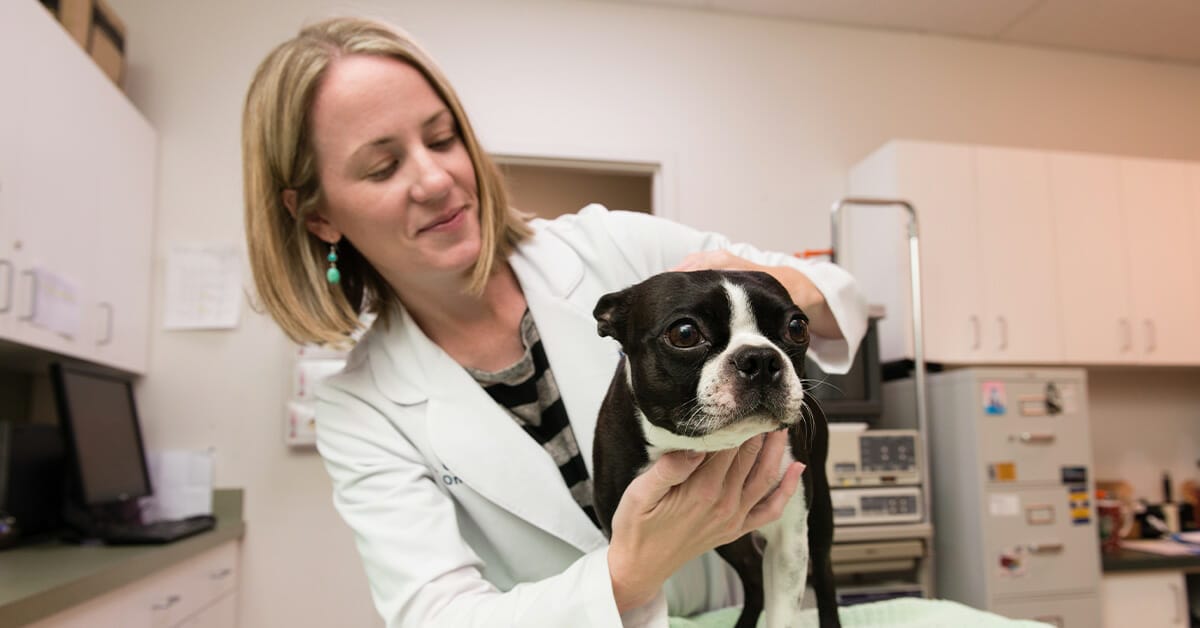Strokes in Dogs: Signs, Treatment, and Prognosis
Dogs who have strokes increase their chance of recovery with prompt veterinary care. Learn the signs of stroke and treatment.
While the thought of your dog having a stroke is distressing, strokes in pets are often less debilitating than in people. Depending on stroke severity, dogs typically have a good prognosis for functional recovery. Additionally, prompt veterinary care can help to identify steps that can be taken to reduce your dog’s chance of stroke recurrence. Read on to learn the signs of stroke in dogs, how they are diagnosed, and treatment options available.
What Causes a Stroke in Dogs?
The brain depends on a constant blood supply to deliver oxygen, remove waste, and supply nutrients. When that blood flow is reduced, such as when a stroke occurs, neurologic signs develop.
There are two different kinds of stroke: hemorrhagic strokes and ischemic strokes. In a hemorrhagic stroke, an artery is weakened or otherwise damaged, leading to local bleeding and changes in local blood flow. The bleeding causes focal damage to the brain. Depending on its severity and location, accumulated blood can also press on surrounding brain tissue, causing damage to that part of the brain. With an ischemic stroke, the blood supply to the brain is suddenly interrupted. This can happen because of trauma, blood clots, tumor cells, bacteria, or parasites, and prevents adequate oxygen flow to the brain.
Although strokes can affect dogs of any age or breed, they more commonly affect middle-age to geriatric dogs, with brachycephalic breeds (i.e. dogs with wide, flat faces), Greyhounds, Cavalier King Charles Spaniels, and Miniature Schnauzers, most prone to strokes.
Signs of Strokes in Dogs
It can be challenging knowing if your dog has had a stroke as the associated signs can also indicate other health conditions. Stroke signs in dogs may include:
- Sudden loss of balance or coordination
- Head tilting or compulsively walking in circles
- Abnormal eye movements
- Weakness or paralysis on one side of the body
- Difficulty walking or standing
- Loss of bladder or bowel control
- Confusion or disorientation
- Seizures
- Abrupt changes in behavior
Keep in mind, dogs will exhibit different neurological signs depending on the damage severity and the part of the brain affected.

Diagnosing Stroke in Dogs
If you suspect your dog has had a stroke, seek immediate veterinary attention. If your family veterinarian is unavailable, go to the nearest MedVet or veterinary emergency hospital. Your family veterinarian may refer you to a veterinary neurologist who specializes in the care and treatment of your dog’s complex nervous system for more advanced diagnostics or treatment.
The veterinarian will perform a thorough physical examination of your pet, review their medical history, and conduct diagnostic tests such as blood pressure checks, blood work, advanced imaging (i.e. MRI or CT scan), and blood clotting analysis. These tests help rule out other conditions and confirm the presence of a stroke. Of note, your pet will need to be anesthetized for advanced imaging, for their safety, comfort, and to obtain the most accurate test results.
Strokes can be confused with a fainting episode known as syncope that is caused by a lack of normal systemic blood flow, often caused by heart disease. Your veterinarian may perform a cardiac evaluation, including an electrocardiogram or cardiac ultrasound, to confirm the condition of your dog’s heart.
Determining the exact cause of a stroke in dogs can be difficult, but certain underlying disease increases their risk of stroke, including Cushing’s disease (hyperadrenocorticism), cancer, heart disease, bleeding disorders, and hypothyroidism.
Stroke Treatment for Dogs
The treatment approach for strokes in dogs focuses on managing their underlying cause, minimizing further damage, and supporting your dog’s recovery. Treatment options may include:
- Medications: Depending on the cause and severity of the stroke, your veterinarian may prescribe medications to reduce inflammation, prevent further blood clots, and/or manage underlying conditions.
- Rehabilitation: Physical therapy, including exercises and range-of-motion activities, can help dogs regain strength and mobility.
- Supportive care: Dogs may require hospitalization for monitoring, intravenous fluids, and assistance with feeding and elimination.

Can My Dog Recover from a Stroke?
The prognosis for dogs that have suffered a stroke varies depending on the severity, underlying cause, and promptness of treatment. Some dogs may experience a full recovery, while others may have residual neurological deficits. It is essential to discuss the prognosis with your veterinarian, as they can provide a more accurate assessment based on your dog’s specific condition.
Home Care for Dogs Recovering from a Stroke
There are several things pet owners can do at home to support their dog’s recovery from stroke, including:
- Follow medication instructions: Administer prescribed medications as directed by your veterinarian.
- Provide a safe environment: Remove any hazards that could cause falls or injuries. Use baby gates to restrict access to stairs or other dangerous areas.
- Assist with mobility: Help your dog move around by using a sling or harness to support their weight and help them with their balance. Gradually increase exercise and physical activity as advised by your veterinarian.
- Maintain a consistent routine: Dogs recovering from a stroke benefit from a stable and predictable routine. Stick to regular feeding times, walks, and play sessions.
- Monitor for changes: Keep a close eye on your dog’s behavior, appetite, and bathroom habits. Report any significant changes to your veterinarian promptly.
While strokes in dogs can be a distressing experience for both pets and their owners, early recognition, prompt veterinary care, and appropriate home care can significantly improve their chances of recovery.
Learn more about veterinary neurology and neurosurgery care.
FAQs
Contents



